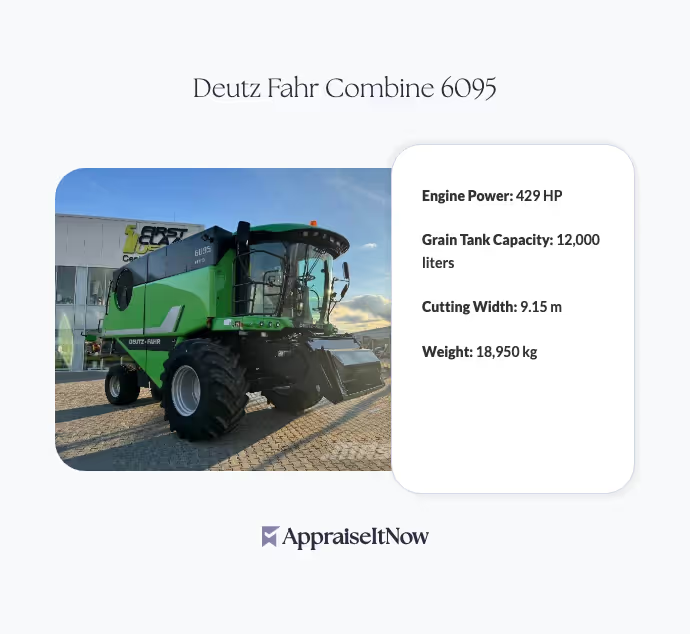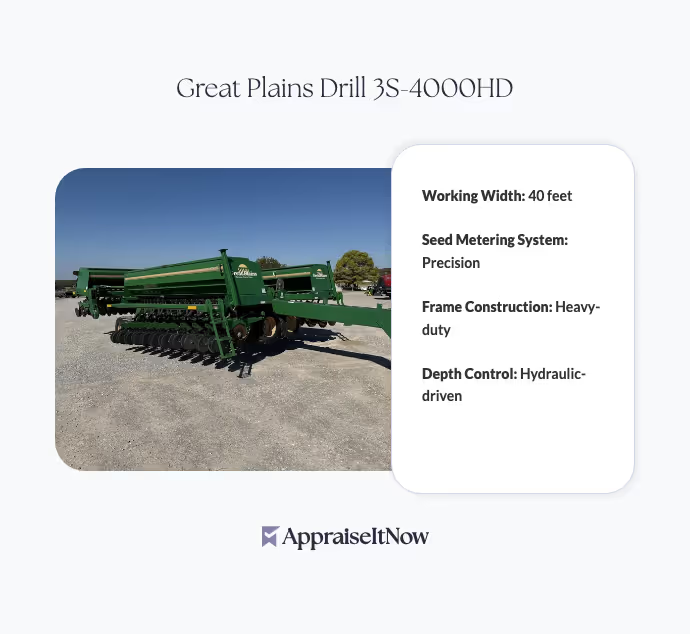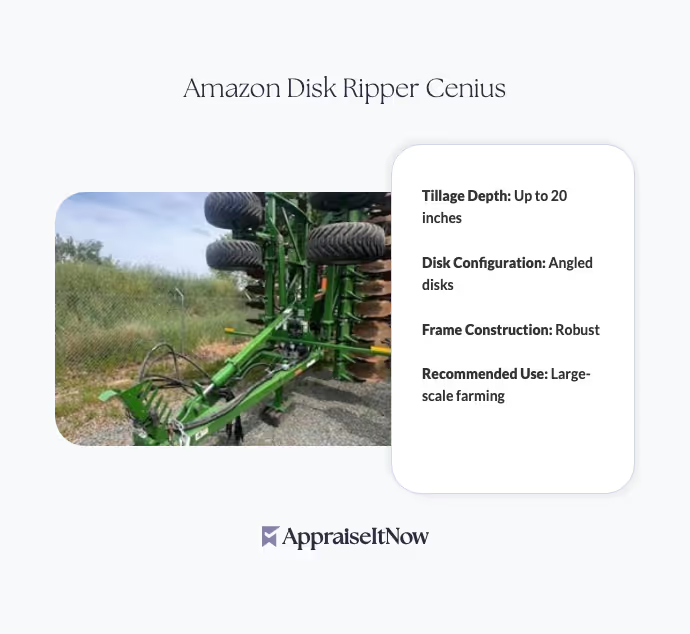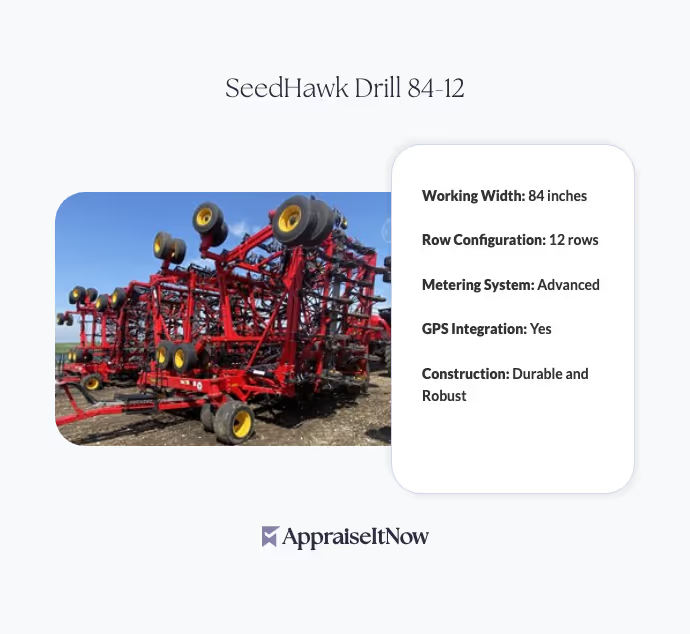<h1>How to Get Your Deutz Fahr Combine 6095 Appraised</h1>
<p>The <strong>Deutz Fahr Combine 6095</strong> represents a substantial investment for modern farming operations. Whether you're evaluating its worth for insurance purposes, preparing for sale, or establishing value for financing, understanding the appraisal process ensures you receive an accurate and defensible valuation. With estimated values ranging from <strong>$100,000 to $150,000</strong>, getting the right appraisal becomes critical to protecting your asset.</p>
<h2>Understanding Your Deutz Fahr Combine 6095's Market Position</h2>
<p>Introduced in 2017, the Deutz Fahr Combine 6095 stands as a high-performance harvesting solution designed for large-scale grain operations. This German-engineered machine combines cutting-edge technology with proven agricultural capabilities, making it a cornerstone asset for modern farmers. Its sophisticated features—including GPS guidance, advanced threshing technology, and customizable performance settings—directly influence its appraisal value compared to older or simpler combine models.</p>
<p>The machine's market strength stems from its reputation for exceptional grain-handling capabilities and operational efficiency. When professional appraisers evaluate <a href="/types/agricultural-equipment">agricultural equipment</a>, they recognize that newer models with integrated technology often command premium valuations. Your 6095's comprehensive feature set positions it favorably in today's agricultural machinery market.</p>
<div class="callout tip"><p><strong>Market Insight</strong></p>
<p>German-manufactured combines typically retain value better than comparable machines from other manufacturers due to engineering reputation and parts availability.</p></div>
<h2>Key Factors That Determine Your Combine's Appraisal Value</h2>
<p>Professional appraisers conducting <a href="/blog/the-basics-of-farm-equipment-appraisal">farm equipment appraisals</a> examine multiple dimensions beyond the machine's age and basic functionality. Understanding these factors helps you prepare for the appraisal process and recognize what drives your specific valuation.</p>
<p><strong>Hours of Operation as a Primary Value Driver</strong></p>
<p>The cumulative hours your Deutz Fahr Combine 6095 has operated dramatically affects its appraised value. Unlike automotive mileage, agricultural equipment hours correlate directly to component wear, particularly in the engine, transmission, and threshing mechanisms. A 2017 model with 500 operating hours exists in fundamentally different condition than one with 2,500 hours. Professional appraisers apply industry-standard depreciation rates that typically range from 15-25% annually for combines in their first five years of operation, with rates moderating as equipment ages. Your documentation of service records becomes essential here—detailed maintenance logs demonstrate responsible operation and help justify valuations within the upper range of market estimates.</p>
<p><strong>Maintenance Records and Service History</strong></p>
<p>Your combine's service documentation substantially impacts its appraised worth. Equipment with comprehensive maintenance records showing regular filter changes, fluid replacements, and component servicing commands valuations 10-20% higher than machines without documented care. Conversely, combines with deferred maintenance issues or repair history require downward adjustments. Professional appraisers verify maintenance through dealer records, service invoices, and physical inspection, making these documents critical to establishing value.</p>
<p><strong>Condition and Physical Wear Patterns</strong></p>
<p>During physical inspection, certified appraisers evaluate multiple condition indicators. The cab's interior condition, visibility features, and control responsiveness reflect overall maintenance standards. Engine compression testing, hydraulic system performance, and threshing mechanism function all influence the final valuation. Rust or corrosion on external surfaces, particularly in the grain handling components, reduces value significantly. Combines stored indoors with regular maintenance typically receive valuations 15-30% higher than those stored outdoors without protection.</p>
<div class="callout note"><p><strong>Preparation Insight</strong></p>
<p>Clean your Deutz Fahr Combine 6095 thoroughly before appraisal and ensure all controls operate smoothly—first impressions substantially influence appraiser perceptions.</p></div>
<h2>Depreciation Patterns for Agricultural Combines</h2>
<p>Understanding typical depreciation trajectories helps you anticipate your machine's valuation within the broader market context. Unlike vehicles subject to uniform depreciation schedules, agricultural equipment follows more complex patterns influenced by technological advances and market conditions.</p>
<p>For combines in the $100,000-$150,000 range like your 6095, depreciation typically follows these patterns across age brackets. New machines (0-2 years) experience steeper depreciation reflecting agricultural equipment price reductions upon purchase. Mid-range equipment (3-7 years) stabilizes at moderate annual depreciation rates around 10-15%. Older machines (8+ years) often appreciate or stabilize if well-maintained, though technological obsolescence can factor into valuations. Your 2017 model's position in this timeline—now approximately 7 years old—places it in a stable depreciation phase where condition and maintenance become primary value determinants rather than simply accounting for age.</p>
<h2>The Role of Local Market Demand and Regional Factors</h2>
<p>When farmers ask how local market demand influences appraisal values for agricultural equipment, the answer reflects supply-and-supply dynamics unique to specific regions. Areas experiencing significant commodity production growth—such as regions expanding grain cultivation or shifting to high-value crops—maintain stronger demand for capable combines like the 6095. Professional appraisers consider regional acreage trends, crop type diversification, and local economic indicators when establishing fair market value.</p>
<p>Your location matters considerably. A Deutz Fahr Combine 6095 in the Corn Belt typically commands valuations 10-15% higher than identical machines in regions with reduced grain production. Local equipment dealer availability also influences value—areas with established Deutz Fahr service networks support premium pricing due to lower maintenance costs and parts accessibility. When seeking professional appraisal services, ensure your appraiser has specific experience evaluating equipment in your geographic market, as this regional expertise directly impacts valuation accuracy.</p>
<h2>Documentation Requirements for Comprehensive Appraisal</h2>
<p>Professional appraisers require specific documentation to establish accurate valuations for <a href="/types/equipment-and-machinery">equipment and machinery</a>. Gathering these materials before your appraisal appointment streamlines the process and ensures nothing delays your valuation. Essential documentation includes the original purchase invoice establishing acquisition date and initial value, the operator's manual confirming specifications and capabilities, and complete maintenance records showing all service performed. Warranty documentation remains valuable even on older equipment, demonstrating manufacturer confidence in the machine's design. Registration or ownership documentation proves clear title, critical for establishing legal value.</p>
<p>If your Deutz Fahr Combine 6095 has undergone major repairs or component replacement, maintain invoices showing what was replaced and when. Documentation of any recalled components or manufacturer service bulletins also factors into the appraisal. For equipment financed through agricultural lenders, statements showing current loan balance help appraisers understand the machine's financial history. Compile photographs from multiple angles showing the cab interior, control systems, and grain handling components—these visual records supplement the physical inspection and provide reference documentation for the appraisal report.</p>
<h2>Additions and Attachments That Enhance Value</h2>
<p>Your combine's value extends beyond the base machine. Specialized attachments and integrated systems significantly enhance appraised worth when properly documented. GPS-guided harvesting systems on modern combines like the 6095 represent substantial factory investments, typically adding 5-10% to machine value. Advanced threshing technology enhancements or efficiency packages specified during manufacture also command premium valuations compared to base-model configurations.</p>
<p>Aftermarket attachments tell a different story. Grain cart coupling systems, specialized chaff management additions, or sensor packages installed post-purchase receive more conservative valuation treatment. Professional appraisers distinguish between factory-integrated technology and field-added modifications, applying appropriate valuation adjustments based on compatibility, condition, and market demand. Documenting which features came factory-installed versus added later becomes essential to establishing accurate value.</p>
<div class="callout tip"><p><strong>Valuation Strategy</strong></p>
<p>Factory GPS systems on your 6095 substantially increase value; retain all documentation showing they were factory-installed rather than retrofitted.</p></div>
<h2>Auction Prices Versus Private Sale Valuations</h2>
<p>When evaluating what your Deutz Fahr Combine 6095 might be worth, you'll encounter different values depending on whether equipment sells at auction or through private transactions. This distinction matters significantly for your appraisal. Auction prices typically reflect lower valuations than private sales because auction purchasing involves uncertainty regarding condition, minimal negotiation time, and buyer competition pressures. Professional appraisers studying the market recognize that auction prices often run 15-25% below comparable private sale values for equipment in similar condition.</p>
<p>Your appraisal value should reflect fair market value—the price at which a willing buyer and willing seller would transact given adequate time for negotiation and proper inspection. This standard typically aligns more closely with private sale data than auction outcomes. If you're collecting comparative sales data yourself, weight private sales more heavily than auction results when understanding your combine's realistic worth. Professional appraisers access verified transaction data distinguishing between auction and private sales, ensuring their valuations reflect accurate market dynamics rather than distorted auction outcomes.</p>
<h2>Preparing Your Combine for Inspection Prior to Appraisal</h2>
<p>Your preparation directly influences the appraisal process and final valuation. Start by thoroughly cleaning the exterior, removing accumulated soil, chaff, and debris that obscure the machine's true condition. Professional appraisers need clear visibility of the grain handling systems, engine compartment, and structural components. Empty the grain tank and hopper completely—appraisers cannot accurately assess internal condition with grain present. Test all control systems to ensure smooth operation: steering, transmission controls, hydraulic functions, and cab climate systems should all respond properly.</p>
<p>Check tire condition if your 6095 remains mobile, and verify that hydraulic hoses show no visible leaks. Engage all mechanical systems gently to demonstrate functionality without causing operational strain. If your machine hasn't operated recently, consult the operator's manual before attempting startup—improper cold starts can damage engines. Prepare a clean, level workspace for the inspection where the appraiser can circulate around the machine and safely access all components. Gather all documentation in a single folder for easy reference during the appraisal visit.</p>
<h2>The Appraisal Timeline and Associated Costs</h2>
<p>When you ask how long an appraisal for a large agricultural machine typically takes, expect the process to require 2-4 hours for a machine like the Deutz Fahr Combine 6095. This timeframe accommodates thorough mechanical inspection, internal component assessment through diagnostic testing, cab system evaluation, and detailed documentation. The appraiser typically concludes with preliminary findings and a timeline for the formal written report, usually delivered within 5-7 business days.</p>
<p>Professional <a href="/blog/the-cost-of-farm-equipment-appraisal">agricultural equipment appraisal costs</a> for combines typically range from $500-$1,200 depending on complexity, location, and appraiser credentials. This investment provides an independent, documented valuation acceptable to financial institutions, insurance companies, and legal proceedings. Some farmers question whether appraisal costs justify their investment, but certified valuations protect substantially larger asset values—spending $750 to accurately value a $125,000 machine represents prudent financial stewardship. For equipment valued under $50,000, abbreviated appraisals may cost less, but machines in the six-figure range warrant comprehensive professional evaluation.</p>
<h2>Understanding USPAP Compliance in Your Appraisal Report</h2>
<p>Your professional appraisal should comply with <strong>Uniform Standards of Professional Appraisal Practice (USPAP)</strong>, which establish ethical and performance standards for all appraisers. USPAP-compliant appraisals provide defensible documentation acceptable in legal, financial, and insurance contexts. AppraiseItNow's appraisers hold credentials including AAA, ISA, ASA, CAGA, and AMEA certifications, ensuring your valuation meets professional standards.</p>
<p>A properly structured appraisal report contains clearly defined value conclusions, documented methodology, and thorough condition assessment narratives. Your report should specify the effective appraisal date, clearly state whether valuation represents replacement cost, fair market value, or insurance value, and provide market analysis supporting the final estimate. These elements distinguish professional appraisals from casual estimates and ensure your documentation withstands professional scrutiny.</p>
<h2>Why Professional Appraisal Protects Your Investment</h2>
<p>Accurate appraisals of your Deutz Fahr Combine 6095 serve multiple critical functions beyond simple curiosity about worth. When financing agricultural equipment through lenders, financial institutions require professional valuations to establish collateral value. Insurance companies need certified appraisals to establish appropriate coverage limits and replacement costs. If you contemplate selling through brokers or dealers, professional valuations provide objective documentation supporting negotiation positions. Estate planning, equipment division in partnership agreements, and tax reporting all benefit from defensible appraisal documentation.</p>
<p>Beyond these formal requirements, professional appraisals provide psychological confidence. Knowing your machine's actual market value—rather than guessing based on anecdotal information—empowers informed financial decisions about equipment investment, maintenance spending, and replacement planning. This knowledge transforms your combine from an asset with uncertain worth into a clearly valued component of your agricultural operation.</p>
<div class="callout note"><p><strong>Key Takeaway</strong></p>
<p>A certified appraisal of your Deutz Fahr Combine 6095 provides the accurate, defensible valuation essential for insurance coverage, financial transactions, and strategic agricultural asset planning. Professional appraisers specializing in <a href="/blog/appraising-agricultural-equipment-assessing-machinery-and-equipment">farm equipment</a> deliver the expertise and documentation necessary to establish your machine's true market value in today's competitive agricultural equipment market.</p></div>
















